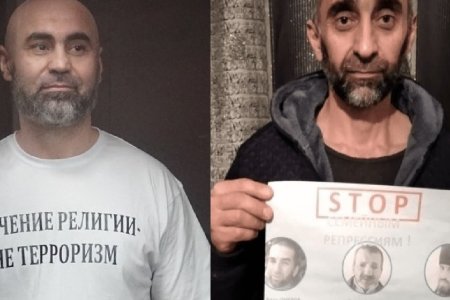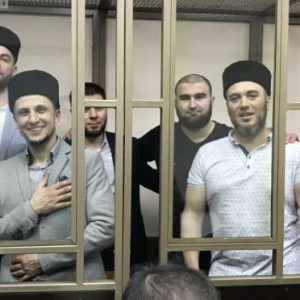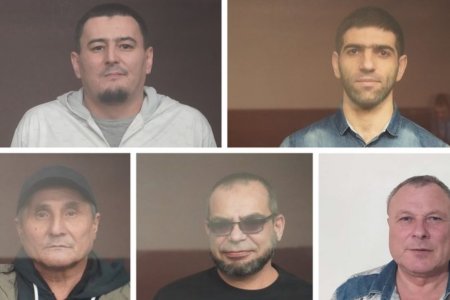
Russia has carried out new armed raids in occupied Crimea terrorising entire families and arresting five Crimean Tatars who are not suspected of any recognizable crime, merely of ‘religious dissidence’. This was the latest of very many such raids carried out over the past ten years in quite different parts of Crimea, but all in February, with the suspicion arising that the FSB have a quota to meet and go for easy targets.
The events that began at 4 a.m. on 5 February were new only in the names of the men targeted, with essentially everything else part of a conveyor belt launched by the FSB soon after Russia’s invasion and annexation of Crimea. This was the fourth time that the FSB have targeted men from villages in the Dzhankoi raion, in the north of Crimea, with the victims including Emir Kurtnezirov (b. 1994), an agronomist and the son of Remzi Kurtnezirov (b. 1962), a local Imam, who was arrested a year ago on identical charges. Four other Crimean Tatars were arrested: Bakhtiyar Ablaev; Rustem Mustafayev (b. 1987); Abibulla Smedlyaev (b. 1991) and Mirzaali Tazhybayev (b. 1980).
Armed ‘searches’
The generally masked men with machine guns who burst into family homes, never make any pretence of looking for weapons or other evidently dangerous items. They only look for so-called ‘prohibited religious literature’ and, increasingly, ‘simplify matters’ by bringing such ‘prohibited literature’ with them and claiming to have ‘found’ it. Shefika Mustafayeva reported on 5 February that the armed men who came for her husband pulled out three books that they had never set eyes on from behind the stove, a place that no devout Muslim would use for religious literature. Leniza Smedlyaeva stated that two books had appeared that she had never seen before, while Emir Kurtnezirov’s wife, Safiye Yakubova also reported that the men had planted two ‘prohibited’ books. This is not a question of ‘her word against theirs’. Until a month and a half ago, there were four political prisoners in Safiye’s family – her father Eldar Yakubov; her uncle Ametkhan Umerov; as well as two more distant uncles Rustem Osmanov and Mustafa Abdurakhmanov. Six weeks ago, she married Emir Kurtnezirov, whose father is also a political prisoner. Remzi Kurtnezirov has indefinite invalid status and had had to give up his role as Imam of the local Muslim community due to his poor state of health. He is, therefore, one of a very small number of political prisoners who have been placed under house arrest. The family, in short, even had they wished to hold religious literature which is entirely legal in Ukraine, but which Russia has ‘prohibited’, would have understood the danger that this posed.
Insane charges
As in all such cases, the men are accused solely of entirely unproven ‘involvement’ in Hizb ut-Tahrir. The latter is a peaceful transnational Muslim organization, which may hold some controversial views, but is legal in Ukraine and is not known to have committed terrorist acts anywhere in the world. The Russian supreme court ruling in 2003 declaring Hizb ut-Tahrir ‘terrorist’ was kept secret until it was too late for the organization and for human rights NGOs to lodge an appeal. No explanation has ever been provided for the ruling which has, since 2015, been used in occupied Crimea as a weapon of religious and political persecution. The FSB in Crimea have particularly targeted civic journalists and activists from the Crimean Solidarity human rights movement, as well as religious communities seen as too ‘independent’ by the ‘official’ Muslim administration which is collaborating with the Russian occupiers.
In none of these cases are any of the men accused of anything that in a democratic country would be recognized as a crime. Both the FSB statement on 5 February and the propaganda media that report on it deliberately use vocabulary aimed at creating an impression of something dangerous and sinister. In fact, even the statement itself makes it that the supposedly ‘conspiratorial cell broken up by the FSB’ was, at most, engaged in circulating ideas that the Russian state does not approve of.
The FSB designate at least one, but sometimes many of those arrested, as ‘organizer’ of such a purported ‘Hizb ut-Tahrir group’ under Article 205.5 § 1 of Russia’s criminal code. The others are accused of ‘involvement’ in such a ‘group’ (Article 205.5 § 2). The difference lies in the length of sentence, with those facing the ‘organizer’ charge almost certain to be sentenced to 17 – 20 years, while ‘involvement’ can carry from 11 – 16 years. Why the FSB designates one or the other charge seems largely arbitrary, although there have been cases where the charge was changed to the more serious ‘organizer’ because, for example, the person refused to remain silent about having been tortured. It has become standard for the FSB to also add the equally absurd charge of planning to violently seize power’, under Article 278.
No evidence
As well as the ‘prohibited literature’ which the FSB claim to have found during searches which lawyers are blocked from attending, these cases rely on flawed assessments by FSB-loyal ‘experts’. The latter are typically given transcripts (often translated with serious, possibly deliberate, mistakes) and encouraged to find ‘proof’ of involvement in Hizb ut-Tahrir in this or that word, or in the men’s expressed concern (for example) about Russia’s persecution of Muslims. The other standard element is the use of ‘secret witnesses’, whose testimony cannot be verified. No reason is ever provided by such alleged, yet entirely anonymous, ‘witnesses’ need to testify in secret, and the judges at the Southern District Military Court in Rostov typically block questions from the defence aimed at demonstrating that the ‘witnesses’ are lying or simply do not know the defendant. All of this has been strongly criticized by the UN General Secretary in his report on occupied Crimea in 2021.
It has long been clear that the same fake ‘secret witnesses’ are used in multiple trials, with the FSB clearly so confident of their impunity that they continue to use them even after their fake testimony has been exposed. It is likely that they will be used in this case as well.



